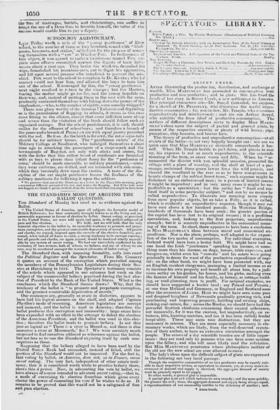THE STANDARD'S MODE OF ARGUING THE BALLOT QUESTION.
THE Standard of Monday last cited us as evidence against the Ballot.
" The United States of America, upon all subjects the favourite model of British Reformers, has been constantly brought before us as the living and unanswerable argument in favour of election by ballot. Secret voting, as practised in the United States, we were told again and again, is the perfect safeguird of pure and free election. . . . . We held, and we still hold, that 'the only material objection to the ballot is, its incurable tendency to promote and perpetuate corruption, and the greatest conceivable depravation of morals. All guards and checks, we argued, imposed upon the exercise of the elective franchise, presumed, what indeed all know to exist, a strong tendency to its corrupt exercise ; but all guards and checks, we again argued, would be rendered utterly unavailable by any system of secret voting. We find-our views fully confirmed by the testimony of two writers, both of whom, we believe, and one of whom we are sure, may be numbered amongst the warmest advocates of ballot-voting."
The Standard then, with imposing formality, calls into court the Political Register and the Spectator. From Mr. COBBETT it quotes an account of the corruption which prevailed among the -members of the Pennsylvanian Legislature during their Session at Harrisburg in 1818. The Spectator's testimony consists of the article which appeared in our columns last week on the subject of the unsuccessful bribery practised during the last election of President by the Bank of the United States. What is the conclusion which the Standard thence draws? Why, that the tendency of the ballot is "to promote and perpetuate corruption, and the greatest conceivable deprivation of morals."
Our contempo:ary, generally so acute in dialectics, appears to have laid his logical acumen on the shelf, and adopted Captain Fluellen's mode of reasoning. American legislators are corrupt and immoral, and the ballot is used in America; therefore the ballot produces this corruption and immorality : large sums have been expended with no effect in the attempt to defeat the election of the American President, and the ballot was used in this election ; therefore the ballot tends to promote bribery. Is not this just-as logical as " There is a river in Macedon, and there is also moreover a river at Monmouth," &es? We were certainly much surprised to find ourselves adduced as witnesses against the ballot, but not less so to *see the Standard exposing itself by such nonsequiturs as these.
Supposing that the bribery alleged to have been used by the United States Bank bad succeeded, instead of failed, still the position of the Standard would not be improved. For the fact is, that voting by ballot, in America, does not, as in France, mean secret voting. The very fact, independent of other ample testimony, that it is considered worth while to practise bribery there, shows this d priori. Now, in advocating the vote by ballot, we have always of course intended to advocate secret voting,—that is, a mode of exercising ths elective franchise which gives every elector the power of concealing his vote if he wishes to do so. It remains to be preyed that this would not be a safeguard of free .and pure election.
sse, .




















 Previous page
Previous page